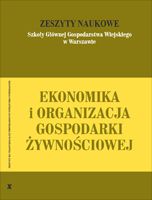Main Article Content
Article Details
BOROWSKA A. (2007): Lojalność klienta jako element budowy rynku produktów tradycyjnych i regionalnych w Polsce. [w:] Marketingowe mechanizmy kształtowania lojalności (red. S. Makarski). Wydawnictwo Uniwersytetu Rzeszowskiego, Rzeszów 2007, s. 294-301.
BOROWSKA A. (2007): Charakterystyka konsumentów żywności tradycyjnej/regionalnej w Polsce, Projekt-grant Agro-Smak 2 Fundacji Fundusz Współpracy (maszynopis powielony).
DUCZKOWSKA-PIASECKA M. (2005): Tradycyjna żywność na obszarach wiejskich. Specyfika budowy rynku. [w:] Gąsiorowski M. (red.): O produktach tradycyjnych i regionalnych. Możliwości a polskie realia. Fundacja Fundusz Współpracy. Warszawa, s. 45.
European Commission, DG-AGRI http://europa.eu.int/comm/agriculture
FOLKESON C. (2005): Geographical Indications and Rural Development in the EU. http://biblioteket.ehl.lu.se/olle/papers
MAZUREK-ŁOPACIŃSKA K. (red.) (2005): Badania marketingowe. Teoria i praktyka. Wyd. Nauk. PWN, Warszawa.
Project DOLPHINS 2001, Contract QLK5-2000-00593, Development of Origin Labelled Products: Humanity, Innovation and Sustainability. Giovanni Belletti, Andrea Marescotti, Silvia Scaramuzzi, OLP sector in Italy. Universita di Firenze - Dipartimento di Scienze Economiche, Firenze, Italia,
Downloads
- Agnieszka Borowska, Changes on the apple market in the European Union countries between 2000–2010 , Zeszyty Naukowe SGGW - Ekonomika i Organizacja Gospodarki Żywnościowej: No. 108 (2014)
- Agnieszka Borowska, The Changes in Fruit Consumption in Poland and in the European Union Countries , Zeszyty Naukowe SGGW - Ekonomika i Organizacja Gospodarki Żywnościowej: No. 39 (2000)
- Agnieszka Borowska, Małgorzata Kosicka, lnformation about Scientific Conference: "Polish Households in the Process of lntegration with the European Union" , Zeszyty Naukowe SGGW - Ekonomika i Organizacja Gospodarki Żywnościowej: No. 38 (2000)
- Agnieszka Borowska, Changes in the Polish plums market, with particular reference to regional plums with protected geographical indications in the period 2010–2016 , Zeszyty Naukowe SGGW - Ekonomika i Organizacja Gospodarki Żywnościowej: No. 124 (2018)
- Agnieszka Borowska, Economic Situation of the Households in Poland and in the European Union Countries in the Nineties , Zeszyty Naukowe SGGW - Ekonomika i Organizacja Gospodarki Żywnościowej: No. 48 (2003)
- Agnieszka Borowska, Information about Seminar for Polish and German PhD Students held on October 1, 1998 in Warsaw Agricultural University , Zeszyty Naukowe SGGW - Ekonomika i Organizacja Gospodarki Żywnościowej: No. 36 (1999)
- Agnieszka Borowska, Tadeusz Filipiak, General Notes on the Scientific Conference: "Directions and Possibilities for Sustainable Development of Agro-food Sector" , Zeszyty Naukowe SGGW - Ekonomika i Organizacja Gospodarki Żywnościowej: No. 43 (2001)
- Agnieszka Borowska, Maria Zajączkowska, Changes in Food Consumption in the CEFTA Selected Countries , Zeszyty Naukowe SGGW - Ekonomika i Organizacja Gospodarki Żywnościowej: No. 38 (2000)
- Agnieszka Borowska, European Union’s Quality Policy on the Example of Traditional and Regional Products , Zeszyty Naukowe SGGW - Ekonomika i Organizacja Gospodarki Żywnościowej: No. 71 (2008)
- Maria Zajączkowska, Agnieszka Borowska, Changes in Meat and Fish Consumption of Households in Poland in the Years 1988-1998 , Zeszyty Naukowe SGGW - Ekonomika i Organizacja Gospodarki Żywnościowej: No. 43 (2001)





